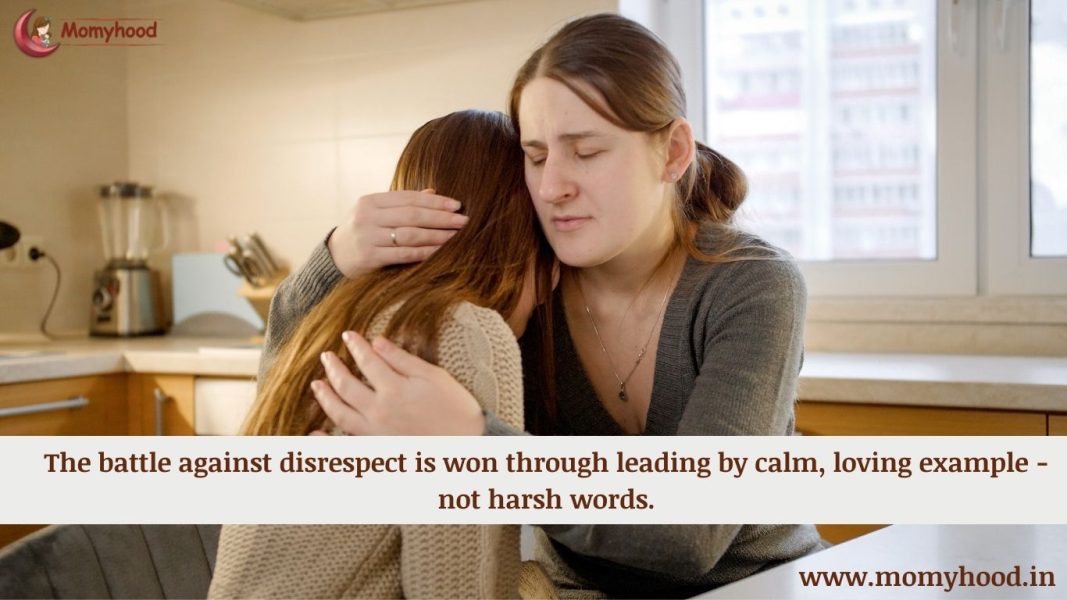As a mother who has raised a son who is now an adult, I know firsthand the challenges of handling a disrespectful adult child. One of the biggest hurdles can be dealing with disrespectful behavior from your once sweet and compliant child, even when they are grown.
It’s a tough transition when your kid, now an adult, starts acting like a smart-mouthed, rebellious person rather than the loving child you’ve known. The disrespect can manifest in many forms – backtalk, eye-rolling, ignoring your advice, and an overall attitude of defiance.
This behavior is incredibly hurtful and can damage the close parent-child bond you’ve worked so hard to build over the years. As a mom who deeply believes in the power of positive thinking, I’ve had to call upon all my skills in manifestation, affirmations, and the law of attraction to get through the difficult phase of handling a disrespectful adult child.
I totally understand how overwhelmed, hurt and helpless you may feel when your adult child is behaving disrespectfully. But I’m here to share my own experiences and insights on handling a disrespectful adult child while keeping your self-respect intact.
Contents
Why Adult Children Get Disrespectful?
First, let’s look at some of the reasons behind disrespect from adult children so we can have empathy rather than just feeling attacked:
- Lingering Tensions From Their Teens – For some, the disrespectful patterns they practiced as teens can spill over into adulthood if unresolved.
- Asserting Independence – Even as adults, some children still rebel and act disrespectfully as a way to create more separation from their parents.
- Differences in Values/Lifestyles – If an adult child’s values or life choices conflict with their parents’, disrespect can arise from judgment on both sides.
- Mental Health Issues – Conditions like depression, anxiety, or substance abuse can contribute to disrespectful outbursts in adult children.
While none of these are excuses for an adult child’s disrespect, understanding potential root causes can make their behavior feel less personal and directed at you as a parent.
Dealing with Disrespect Through Affirmations
As a big believer in manifestation, I’ve found positive affirmations to be incredibly powerful tools for reframing my mindset when dealing with my adult child’s disrespectful attitude. Every morning, I spend time reciting affirmations out loud such as:
- “I am nurturing a respectful, loving relationship with my adult child.”
- “I have infinite patience as I work through this phase of handling my disrespectful adult child.”
- “My child’s current attitude is temporary, and our bond is unbreakable.”
- “I speak words of wisdom and lead by example for my disrespectful adult child.”
I truly believe that reciting these positive statements out loud helps to manifest handling the disrespect from an adult child in a healthy way. Doing affirmations prevents me from meeting my son’s negativity with more negativity. It’s easy to get caught in the disrespect cycle, but meeting disrespect with anger, sarcasm or punitive actions often makes the situation worse.
Staying Calm and Setting Boundaries
When your teenager misbehaves and is disrespectful toward you, it’s vital to stay calm. Take a deep breath, don’t take their words personally, and respond with:
- A soft, level voice
- An “I” statement about how their behavior makes you feel (not accusations)
- A reminder of which boundary they’ve crossed
- A reiteration of the consequences if they choose to continue the disrespectful behavior
For example: “When you talk to me that way, I feel very disrespected as your mother. In our family, we speak respectfully, even as adults. If you’d like to rephrase that politely, I’ll listen. Otherwise, as your mother I cannot accept that type of disrespectful behavior from an adult child.”
Following through on the consequences calmly and consistently reinforces your boundaries. They may push back at first, but ultimately this teaches them to take responsibility for their own actions and speech.
Also read: 5 Things Parents Can Do to Manage Anger Effectively in Kids – Tips By A Mom Herself!
Kill Them with Empathy and Kindness
As a big believer in the law of attraction, I’ve found that defusing disrespect with kindness can be a game-changer. When my son misbehaves and is disrespectful toward me, my instinct is to fire back with anger and sarcasm. But I’ve realized that just breeds more disrespect.
Instead, I’ll take a breath and respond with:
- “I understand you’re going through a lot of changes right now, and it can’t be easy.”
- “I remember feeling exactly the way you do when I was your age.”
- “I still care about you deeply, even when we’re frustrated with each other.”
Meeting disrespect with empathy diffuses the negativity when handling a disrespectful adult child. More times than not, my son’s attitude shifts too when I make the effort to connect with what he’s going through. This also models the golden rule of treating others as you want to be treated. When I’m calm and respectful, it makes it easier for my son to reset and match my energy…eventually.
The Power of Quality Time
Speaking of connection, spending quality 1-on-1 time with your teen is huge. Set a recurring weekly “date” for just the two of you to go for a coffee, see a movie, or go for a long walk together.
With my son, I’ve found those shared pockets of uninterrupted, neutral time help to:
- Diffuse recent tensions between us when we just hang out as buds
- Get him to open up more in a relaxed setting outside the house
- Strengthen our bond by making fun memories together
- Remind us both of the positive reasons we care about each other
Even if he acts disinterested in our mother-son dates at first, keep scheduling them. Once you get that quality facetime, the impact is invaluable for resetting your relationship and not letting an adult child’s disrespect take over entirely.
Self-Care for Mom is Key
Finally, one of my most vital pieces of advice for handling a disrespectful adult child is to take care of yourself first. His disrespect is not a true reflection of your worth as his mother or as a person.
Make sure you’re channeling your own positive energy through:
- A daily meditation or prayer practice
- Reciting affirmations, as mentioned earlier
- Scheduling self-care like massages, therapy, exercise
- Nurturing your relationship with your partner or closest friends
- Having firm boundaries on what you’ll accept and not accept from your child
Additional Tips for Handling a Disrespectful Adult Child
Here are some additional tips for handling a disrespectful adult child:
- Stay calm: It’s important to stay calm and composed, even when your child is being disrespectful. This can help to de-escalate the situation and prevent it from getting worse.
- Listen actively: Make sure to listen actively to your child’s concerns and feelings. This can help to build trust and understanding between you and your child.
- Avoid blaming: Try to avoid blaming your child for their behavior. Instead, focus on finding solutions and ways to move forward.
- Practice self-care: It’s important to take care of yourself, both physically and emotionally, when dealing with a disrespectful adult child. This can help you to stay calm and focused, and can also help to prevent burnout.
- Consider family therapy: Family therapy can be a helpful way to address disrespectful behavior and improve communication within the family.
- Seek support: Don’t be afraid to seek support from friends, family, or a professional counselor. This can help you to feel less alone and can provide you with valuable guidance and support.
Remember, handling a disrespectful adult child is not always easy, but with patience, understanding, and the right tools, it is possible to maintain a healthy and positive parent-child relationship.
Conclusion
I know dealing with a disrespectful teenage kid is soul-crushing at times. But stay strong in your self-worth and confidence as a parent. You’ve got this. With boundaries, open communication and most of all – lots and lots of love – you can get through this phase of handling a disrespectful adult child. And your close parent-child bond will be even stronger when your child emerges as a respectful, responsible adult.
Additional Resources
For more information and resources on handling a disrespectful adult child, please see this article: How Do You Deal with a Disrespectful Grown Child?
I hope this article has been helpful in providing guidance and support for parents dealing with handling a disrespectful adult child. Remember, you are not alone, and with patience, understanding, and the right tools, you can navigate this challenging situation and maintain a healthy and positive parent-child relationship.
Your comments and shares do more than just support our blog—they uplift the amazing moms who share their stories here. Please scroll down to the end of the page to leave your thoughts, and use the buttons just below this line to share. Your support makes a big difference!



